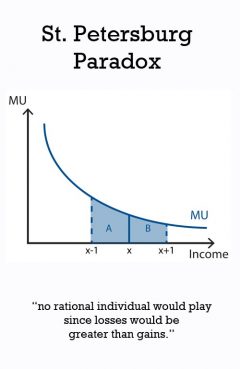St. Petersburg Paradox

Release Date: 9/9/1713
Country of Release:
Length:
MPAA:
Medium: Paradox
Genre:
Release Message: People will only offer a modest fee for a reward of infinite expected value. Authored by Daniel Bernoulli.
Description: People will only offer a modest fee for a reward of infinite expected value. In economics, the St. Petersburg paradox is a paradox related to probability theory and decision theory. It is based on a particular (theoretical) lottery game (sometimes called St. Petersburg Lottery) that leads to a random variable with infinite expected value, i.e., infinite expected payoff, but would nevertheless be considered to be worth only a very small amount of money. The St. Petersburg paradox is a classical situation where a na¥ve decision criterion (which takes only the expected value into account) would recommend a course of action that no (real) rational person would be willing to take. Several resolutions are possible. The paradox is named from Daniel Bernoulli's presentation of the problem and his solution, published in 1738 in the Commentaries of the Imperial Academy of Science of Saint Petersburg (Bernoulli 1738). However, the problem was invented by Daniel's cousin Nicolas Bernoulli who first stated it in a letter to Pierre Raymond de Montmort of September 9, 1713 (de Montmort 1713).